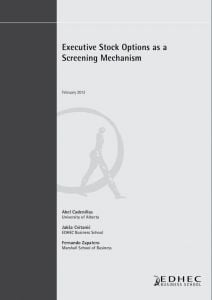

Executive Stock Options as a Screening Mechanism
The finance literature has shown that option grants can help to screen out low-ability executives. In this paper we develop a framework that allows us to analyse when options are likely to be optimal for this purpose. We consider a dynamic setting with asymmetric information, in which risk-neutral firms hire risk-averse executives who can exercise costly effort and choose among a menu of risky projects. We show that the likelihood of using options increases with the dispersion of types and the size of the firm, and decreases with the availability of growth opportunities for the firm.
Author(s):
Summary:
The finance literature has shown that option grants can help to screen out low-ability executives. In this paper we develop a framework that allows us to analyse when options are likely to be optimal for this purpose. We consider a dynamic setting with asymmetric information, in which risk-neutral firms hire risk-averse executives who can exercise costly effort and choose among a menu of risky projects. We show that the likelihood of using options increases with the dispersion of types and the size of the firm, and decreases with the availability of growth opportunities for the firm.
Register to download PDF
Register/Log in| Type : | Working paper |
|---|---|
| Date : | 02/06/2012 |
| Keywords : |
Business Analysis |

